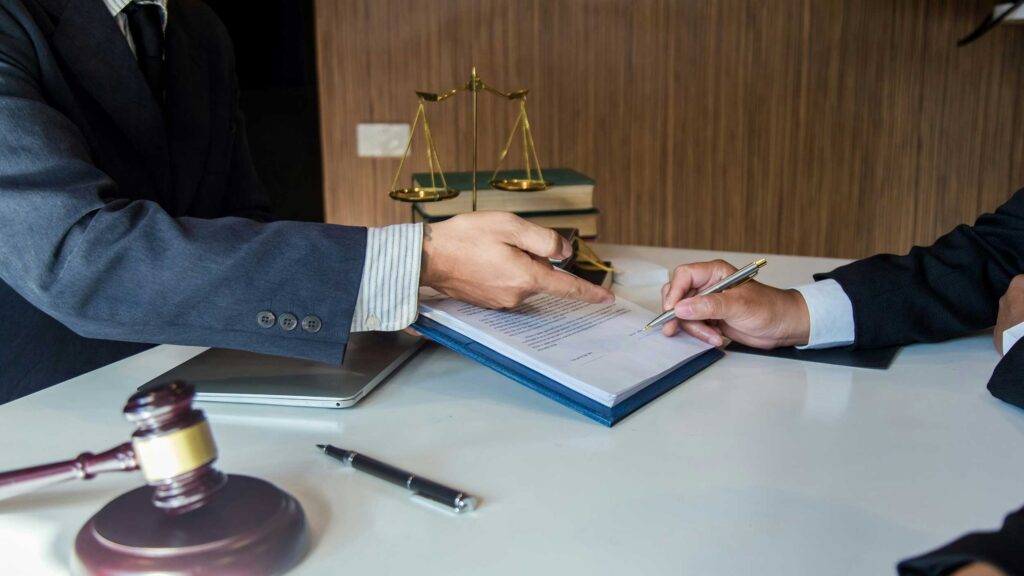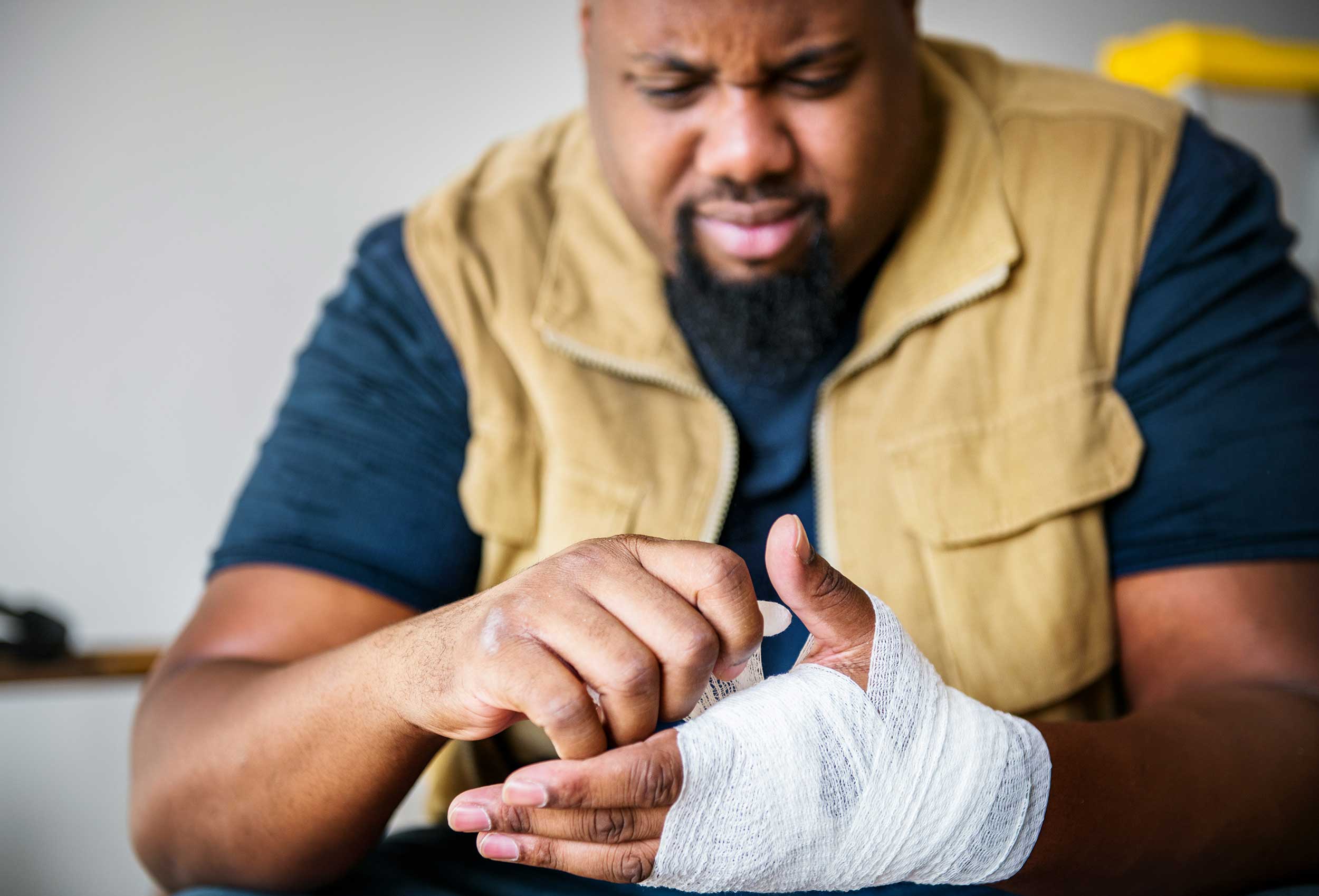Navigating the legal maze can be overwhelming, especially when you’re dealing with a personal injury. In times like these, having the right personal injury attorney by your side can be a lifeline, guiding you through the complexities of the legal system and fighting for your rights. If you’ve been injured in a car accident, slip and fall, or any other accident caused by negligence, Teston & Burruss is here to help you get the compensation you deserve.
With our expertise, we provide invaluable support by investigating the accident, gathering evidence, negotiating with insurance companies, and representing your interests in court if necessary. Moreover, we ensure that you don’t fall victim to the tactics used by insurance companies to deny or reduce your claim.
Finding the right personal injury attorney may seem daunting, but it’s crucial to choose someone experienced in handling cases like yours. At Teston & Burruss, we specialize in personal injury cases, bringing decades of combined experience to the table. By enlisting our help, you can navigate the legal maze with confidence and focus on your recovery. Don’t underestimate the importance of having a legal expert by your side during this challenging time—we’re here to be your lifeline.

Understanding Personal Injury Law
Personal injury law is a broad legal field that encompasses a wide range of accidents and incidents that result in physical, emotional, or psychological harm to an individual. At its core, personal injury law is designed to provide legal recourse for those who have been injured due to the negligence or intentional actions of another party. This could include car accidents, slip and fall incidents, medical malpractice, product liability cases, and even workplace accidents.
The primary goal of personal injury law is to ensure that the injured party is adequately compensated for their losses, which can include medical expenses, lost wages, pain and suffering, and other damages. Our legal team has extensive experience with the nuances of personal injury law, from state-specific statutes to federal regulations. To achieve this, personal injury cases typically involve proving that the defendant’s actions or inactions were the direct cause of the plaintiff’s injuries, and that the defendant had a duty of care to the plaintiff that was breached. This can be a complex and challenging process, which is why having an experienced personal injury attorney on your side is so important.
Personal injury law is governed by a variety of state and federal statutes, as well as a body of case law that has been developed over time. These laws and precedents can vary greatly between jurisdictions, making it essential for those seeking personal injury claims to work with an attorney who understands the specific laws and regulations relevant to their case.
Common Types of Personal Injury Cases
One of the most common types of personal injury cases involves car accidents. When a driver’s negligence, such as distracted driving, speeding, or driving under the influence, results in a collision that causes injury to another person, the injured party may have grounds for a personal injury lawsuit. This can include compensation for medical expenses, lost wages, and pain and suffering.
Another prevalent type of personal injury case is the slip and fall incident. These cases can occur when a property owner fails to maintain their premises in a safe condition, leading to a slip, trip, or fall that results in injury. This could include cases where a business owner neglects to clean up a spill or clear a hazardous walkway, or where a homeowner fails to repair a broken staircase or uneven flooring.
Medical malpractice is another area of personal injury law that can have significant consequences for those affected. When a healthcare provider, such as a doctor, nurse, or hospital, fails to provide the standard of care expected and this results in injury or harm to the patient, the patient may have grounds for a medical malpractice lawsuit. This can include cases of misdiagnosis, surgical errors, medication errors, and more.
Product liability cases are another common type of personal injury claim, where a defective or dangerous product causes harm to the user. This could include anything from faulty consumer electronics to dangerous pharmaceuticals or automotive parts. In these cases, the injured party may be able to seek compensation from the manufacturer, distributor, or retailer of the product.
Workplace accidents are also a significant area of personal injury law. When an employee is injured on the job due to unsafe working conditions, faulty equipment, or the negligence of an employer or co-worker, they may be entitled to workers’ compensation benefits or, in some cases, a personal injury lawsuit.
The Role of a Personal Injury Attorney
When an individual is injured due to the negligence or intentional actions of another party, a personal injury attorney can play a crucial role in helping them navigate the legal system and obtain the compensation they deserve. These attorneys specialize in personal injury law, handling tasks like investigating incidents, gathering evidence, negotiating with insurance companies, and representing clients in court when necessary.
One of the primary responsibilities of a personal injury attorney is to thoroughly investigate the circumstances surrounding the accident or incident that led to the client’s injuries. This may involve gathering witness statements, reviewing police reports, analyzing medical records, and consulting with expert witnesses to build a strong case. By conducting a thorough investigation, the attorney can help establish liability and demonstrate the full extent of the client’s damages.
In addition to investigating the case, personal injury attorneys are also responsible for negotiating with insurance companies on behalf of their clients. Insurance companies often employ a range of tactics to minimize the amount of compensation they pay out, such as denying claims or offering low-ball settlements. A skilled personal injury attorney can counter these tactics, negotiating aggressively to ensure that their client receives the maximum compensation possible for their injuries and losses.
If a settlement cannot be reached through negotiation, a personal injury attorney may need to represent their client in court. This can involve preparing and filing a lawsuit, conducting discovery, and presenting the case before a judge or jury. Throughout the legal process, the attorney will work tirelessly to protect their client’s rights and interests, advocating on their behalf to secure the best possible outcome.
Benefits of Hiring a Personal Injury Attorney
Navigating the legal system after a personal injury can be a daunting and overwhelming experience, especially for those who are already dealing with the physical and emotional toll of their injuries. This is where the expertise of a personal injury attorney can be invaluable.
One of the primary benefits of hiring a personal injury attorney is their deep understanding of the complex legal landscape surrounding personal injury cases. These attorneys are well-versed in the relevant laws, regulations, and procedures that govern such cases, allowing them to effectively navigate the legal maze on behalf of their clients. Our attorneys have decades of experience in handling intricate legal issues, including disputed liability and complex damage assessments. This expertise can be particularly crucial in cases where liability is disputed or the extent of the damages is unclear.
Insurance companies often aim to reduce compensation using various tactics. A skilled personal injury attorney can counter these strategies, negotiating aggressively to ensure clients receive the full and fair compensation they deserve.
In addition to their negotiation skills, personal injury attorneys can also provide invaluable assistance in gathering and presenting evidence to support their client’s case. This may involve working with medical experts, accident reconstruction specialists, and other professionals to build a comprehensive and compelling case. By leveraging their resources and expertise, personal injury attorneys can significantly improve the chances of their clients receiving the compensation they deserve.
Perhaps most importantly, hiring a personal injury attorney can provide peace of mind and emotional support during a difficult and stressful time. Our clients often express how reassuring it is to have a knowledgeable and compassionate legal advocate by their side, providing guidance and fighting for their best interests. Dealing with the aftermath of a personal injury can be overwhelming, and having a knowledgeable and experienced legal advocate by your side can make all the difference in navigating the process and achieving a successful outcome.

How to Choose the Right Personal Injury Attorney
- Experience and Track Record: Look for an attorney who has a proven track record of successfully handling personal injury cases, particularly those that are similar to your own. Ask about their experience, the types of cases they have handled, and their success rate in obtaining favorable outcomes for their clients.
- Specialization: Personal injury law is a broad field, and different attorneys may specialize in specific types of cases, such as car accidents, medical malpractice, or product liability. Choose an attorney who specializes in the type of personal injury case you are dealing with, as this will ensure they have the necessary expertise and resources to effectively represent your interests.
- Communication and Responsiveness: During the initial consultation and throughout the legal process, pay attention to how the attorney communicates with you. Do they take the time to explain things clearly and answer your questions? Are they responsive to your calls and emails? Effective communication and responsiveness are crucial for building trust and ensuring a positive client-attorney relationship.
- Reputation and Reviews: Research the attorney’s reputation within the legal community and among past clients. Look for online reviews, testimonials, and ratings from reputable sources to get a sense of the attorney’s level of professionalism, integrity, and success in representing their clients. Our firm is consistently recognized for our dedication and outstanding results, as reflected in client testimonials and industry accolades.
- Fee Structure: Personal injury attorneys typically work on a contingency fee basis, meaning they only get paid if they successfully recover compensation for their client. Understand the attorney’s fee structure, including the percentage they will take from any settlement or award, as well as any additional costs or expenses you may be responsible for.
The Legal Process for Personal Injury Cases
When an individual is injured due to the negligence or intentional actions of another party, the legal process for pursuing a personal injury claim can be complex and multifaceted. However, understanding the general steps involved can help provide a roadmap for navigating the legal maze.
The first step in the process is to file a personal injury claim. This typically involves the injured party, or their personal injury attorney, submitting a formal claim to the responsible party’s insurance company, outlining the details of the incident and the resulting injuries and damages. The insurance company will then review the claim and determine whether to accept or deny it.
If the insurance company denies the claim or offers an inadequate settlement, the next step is to file a personal injury lawsuit. This involves the injured party, or their attorney, filing a complaint with the appropriate court, alleging that the defendant’s actions or inactions were the direct cause of the plaintiff’s injuries. The defendant will then have the opportunity to respond to the complaint and defend their case.
During the discovery phase of the legal process, both the plaintiff and the defendant will gather and exchange evidence, including witness statements, medical records, and any other relevant documentation. This phase can be time-consuming and may involve depositions, interrogatories, and other legal proceedings.
If a settlement cannot be reached through negotiations, the case may proceed to trial. During the trial, the plaintiff’s attorney will present their case to a judge or jury, providing evidence and testimony to demonstrate the defendant’s liability and the extent of the plaintiff’s damages. The defendant’s attorney will then have the opportunity to present their defense and challenge the plaintiff’s claims.

Gathering Evidence for Your Personal Injury Case
Gathering evidence is a critical component of any successful personal injury case. The evidence collected can help to establish liability, demonstrate the extent of the plaintiff’s injuries and damages, and strengthen the overall case. Here are some of the key types of evidence that a personal injury attorney may gather in support of a client’s claim:
- Medical Records: Comprehensive medical records, including doctor’s notes, diagnostic test results, and documentation of treatment and recovery, are essential for demonstrating the extent and impact of the plaintiff’s injuries. Our firm works closely with medical experts to ensure that every detail of your injury and treatment is thoroughly documented.
- Witness Statements: Eyewitness accounts from individuals who observed the incident or its aftermath can provide valuable corroborating evidence. Personal injury attorneys may seek out and interview potential witnesses, obtaining written statements or deposition testimony to support the plaintiff’s case.
- Photographic and Video Evidence: Visual documentation of the accident scene, the plaintiff’s injuries, and any relevant property damage can be incredibly powerful evidence in a personal injury case. We often collaborate with accident reconstruction specialists and private investigators to capture critical visual evidence.
- Expert Testimony: In some cases, the personal injury attorney may need to rely on the expertise of professionals, such as medical experts, accident reconstructionists, or financial analysts, to provide testimony and analysis that supports the plaintiff’s claims. These experts can help to establish causation, quantify damages, and rebut any arguments made by the defense.
- Police Reports and Other Official Documentation: Depending on the nature of the incident, official reports and documentation, such as police reports, incident reports, or workplace safety records, can provide important evidence to support the plaintiff’s case.
Negotiating a Settlement with Insurance Companies
One of the primary responsibilities of a personal injury attorney is to negotiate a fair and just settlement with the insurance companies involved in the case. Insurance companies often try to minimize compensation payouts by using various tactics. A skilled personal injury attorney can effectively counter these strategies to ensure their client receives the full and fair compensation they deserve.
The first step in the negotiation process is for the personal injury attorney to thoroughly review the details of the case, including the extent of the plaintiff’s injuries, the medical expenses incurred, and any lost wages or other damages. This information is then used to calculate a reasonable settlement amount that takes into account the full scope of the plaintiff’s losses.
Next, the personal injury attorney will engage in negotiations with the insurance company, presenting the evidence and arguments in support of the plaintiff’s case. This may involve providing detailed documentation, such as medical records and expert testimony, to demonstrate the validity and severity of the plaintiff’s injuries. The attorney may also need to counter any attempts by the insurance company to downplay or deny the extent of the damages.
Throughout the negotiation process, the personal injury attorney must be prepared to stand firm and advocate aggressively on behalf of their client. Insurance companies may try to lowball the settlement offer or employ other tactics to pressure the plaintiff into accepting a less-than-favorable deal. The attorney’s role is to resist these tactics and negotiate a settlement that fully compensates the plaintiff for their losses.
If the insurance company remains unwilling to offer a fair settlement, the personal injury attorney may need to take the case to trial. This can be a risky and time-consuming process, but it may be necessary to ensure that the plaintiff receives the compensation they deserve.
Going to Trial: What to Expect in a Personal Injury Lawsuit
In some cases, the negotiation process with insurance companies may not result in a satisfactory settlement, and the personal injury case may need to proceed to trial. While the prospect of going to court can be daunting, understanding what to expect can help prepare the plaintiff and their attorney for the legal process.
The first step in a personal injury trial is the jury selection process, where potential jurors are questioned and screened to ensure an impartial and unbiased panel. This can be a critical stage, as the composition of the jury can have a significant impact on the outcome of the case.
Once the jury is selected, the trial will begin with the plaintiff’s attorney presenting their case. This will involve calling witnesses, introducing evidence, and making arguments to demonstrate the defendant’s liability and the extent of the plaintiff’s damages. The defendant’s attorney will then have the opportunity to cross-examine witnesses and present their own evidence and arguments in defense.
Throughout the trial, both the plaintiff’s and the defendant’s attorneys will engage in a variety of legal maneuvers, such as objections, motions, and requests for rulings from the judge. These tactics are aimed at shaping the evidence and influencing how the jury perceives the case.
After all the evidence and arguments are presented, the judge instructs the jury on the relevant laws and standards for reaching a verdict. The jury then deliberates privately and decides whether the defendant is liable and, if so, the amount of damages to award the plaintiff.
If the jury finds in favor of the plaintiff, the defendant may have the option to appeal the decision, which could lead to a new trial or a modification of the award. Conversely, if the jury finds in favor of the defendant, the plaintiff may have the opportunity to appeal the decision, though the success of such an appeal can be uncertain.
Why a Personal Injury Attorney Is Essential for Navigating the Legal Maze
In the aftermath of a personal injury, navigating the legal system can be a daunting and overwhelming experience. However, with the guidance and expertise of a skilled personal injury attorney, individuals who have been injured due to the negligence or intentional actions of another party can have a much better chance of obtaining the compensation they deserve.
At Teston & Burruss, we are highly knowledgeable in the complex laws and regulations that govern personal injury cases, and we use this expertise to effectively investigate incidents, gather evidence, negotiate with insurance companies, and, if necessary, represent our clients in court. By leveraging our resources and experience, we significantly improve the chances of a successful outcome for our clients.
Moreover, we provide invaluable emotional support and guidance during this difficult and stressful time. Our firm is committed to achieving the best legal results while supporting clients through the emotional challenges of personal injury cases. Dealing with an injury can be draining, and having a committed legal advocate makes a vital difference in protecting your rights and prioritizing your interests.
Ultimately, the decision to hire a personal injury attorney is a highly personal one, and it will depend on the specific circumstances of the case and your comfort level with navigating the legal system. For those injured due to someone else’s negligence or intentional actions, working with a skilled personal injury attorney offers immeasurable benefits. By leveraging our expertise and resources, you can navigate the legal maze with confidence and focus on your recovery, knowing that you have a dedicated advocate fighting for your rights and your future.



